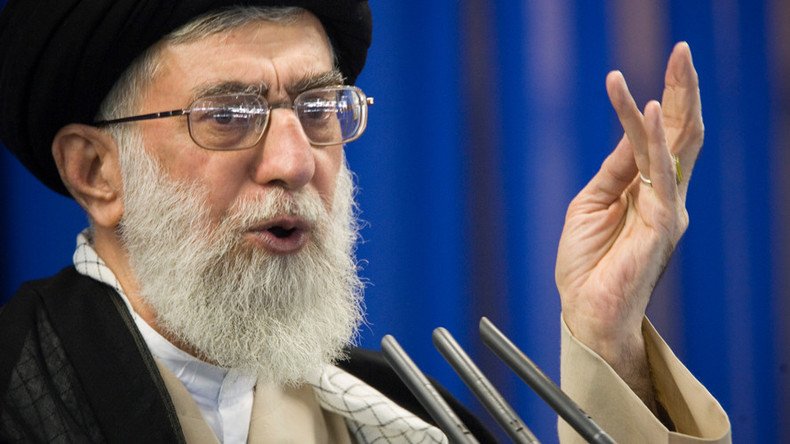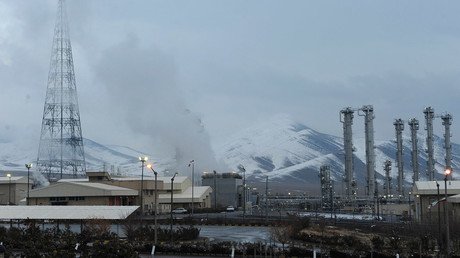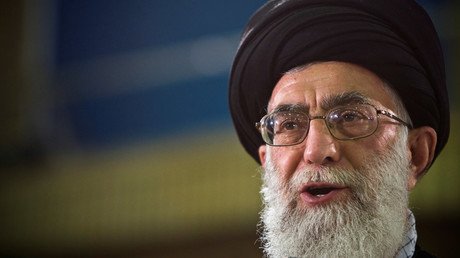‘Iran will not stand idly by’ if US sanctions are extended – Ayatollah Khamenei

Iranian Supreme Leader Ayatollah Khamenei has warned the American government that if it renews sanctions over his country’s nuclear program for another ten years, there will be consequences.
Khamenei was referring to a session of the US House of Representatives on 15 November, where the majority voted, 419 to 1, to extend the Iran Sanctions Act (ISA) for another ten years, despite commitments the US has already made to lift the sanctions if Iran curbed its nuclear program. On Tuesday, Ayatollah Khamenei warned the United States not to renege on its agreement.
Speaking at a gathering of the Revolutionary Guards, Khamenei said that America should brace itself for the consequences if it renews the sanctions on Iran.
“The current government of the United States has breached the JCPOA [Joint Comprehensive Plan of Action] on multiple occasions; the most recent being a 10-year extension of existing sanctions,” he said in a speech reprinted on his official website.
“If these sanctions are put into place, the JCPOA has certainly been breached and they [the USA] should be aware that the Islamic Republic of Iran will not stand by idly,” Iran’s supreme leader warned.
The JCPOA is a deal which came into force last year under President Obama, which was reached after over a decade of negotiations between Iran and six major world powers. It restricts Iran’s nuclear ambitions in exchange for the international community lifting sanctions on the Islamic republic. The ISA has been in place since 1996 and has badly hurt the Iranian economy, but the US government believes it is necessary to maintain it to stop Iran from developing nuclear weapons, which it fears will destabilize the region. The Iranians have consistently insisted that their nuclear program is entirely peaceful, and are working with Russia to finish the expansion of the Bushehr nuclear power plant by 2017.
For its part, Iran has been complying with its obligations to the international community. In early November, it exceeded its 130-ton limit for producing heavy water that can be used to make nuclear weapons by just 0.1 ton, but a diplomat has promised to ship the excess out of the country as soon as possible.
Despite Iran living up to its side of the bargain, last week, members of the House of Representatives voted to renew sanctions on Iran for another ten years.
READ MORE: Trump secretary of state contender says regime change ‘only solution’ in Iran
The sanctions should be lifted at the end of 2016, given Iran’s compliance with the terms of the JCPOA, but the House voted to keep the ISA in place anyway.
“Despite the Obama administration’s dangerous nuclear deal, this law remains critical to U.S. efforts to counter the full range of Iran’s malicious activity,” said Republican Congressman Ed Royce.
“Its expiration would compound the damage done by the president’s dangerous nuclear deal and send a message that the United States will no longer oppose the destructive role of Iran in the Middle East,” he insisted.
The motion still has to go through the Senate and receive presidential approval, but Republican Senate leader Mitch McConnell told reporters last Wednesday that it will be passed, and President-elect Donald Trump told an Israeli lobby group in March that his “number one priority” would be to “dismantle the disastrous deal with Iran.”
The Obama administration, meanwhile, has been contemplating taking measures aimed at keeping the Iran deal afloat, including allowing for more US businesses to operate there.
The United States and Iran have been enemies since the 1979 Iranian Revolution, when pro-American Shah Pahvali was ousted and 52 US diplomats were taken hostage by radical students. The situation has been further complicated by the US’ unconditional support for Israel and Iran’s support for Hezbollah, a Lebanese Shia group.
Ayatollah Khamenei himself is known to be a hardliner and has previously expressed his skepticism that any rapprochement with the US was possible, accusing Washington of being a “liar, disloyal, cheater and stabber in the back” at a speech to some students in Tehran earlier in November.















